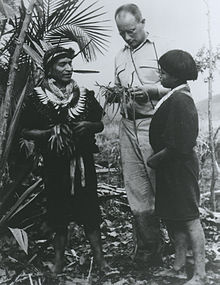Richard Evans Schultes
| Richard Evans Schultes | |
|---|---|

Dr. Richard Evans Schultes in the Amazon
|
|
| Born |
12 January 1915 Boston |
| Died | 10 April 2001 (aged 86) Boston |
| Residence | Cambridge, Massachusetts |
| Citizenship | United States |
| Nationality | American |
| Fields | ethnobotany |
| Institutions | Harvard University |
| Alma mater | Harvard University |
| Doctoral advisor | Oakes Ames |
| Known for | · studying Native American uses of entheogenic or hallucinogenic plants · ethnobotanical discoveries including source of the dart poison (curare) · alerted world to destruction of Amazon rainforest and people |
| Influences | Oakes Ames, Richard Spruce |
| Influenced |
E.O. Wilson, Andrew Weil Daniel Goleman, Alan Ginsberg Alejo Carpentier, William S. Burroughs Wade Davis, Mark Plotkin, Terence McKenna, Timothy Plowman |
| Notable awards |
· Gold Medal - Linnean Society of London · The Cross of Boyaca |
| Author abbrev. (botany) | R.E.Schult. |
· Gold Medal - Linnean Society of London
Richard Evans Schultes (SHULL-tees; January 12, 1915 – April 10, 2001) was an American biologist. He may be considered the father of modern ethnobotany, for his studies of indigenous peoples' (especially the indigenous peoples of the Americas) uses of plants, including especially entheogenic or hallucinogenic plants (particularly in Mexico and the Amazon), for his lifelong collaborations with chemists, and for his charismatic influence as an educator at Harvard University on a number of students and colleagues who went on to write popular books and assume influential positions in museums, botanical gardens, and popular culture.
His book The Plants of the Gods: Their Sacred, Healing, and Hallucinogenic Powers (1979), co-authored with chemist Albert Hofmann, the discoverer of LSD, is considered his greatest popular work: it has never been out of print and was revised into an expanded second edition, based on a German translation by Christian Rätsch (1998), in 2001.
Schultes was born in Boston, his father was a plumber and his mother was a homemaker. He grew up and was schooled in East Boston. His interest in South American rain forests traced back to his childhood: while he was bedridden, his parents read him excerpts of Notes of a Botanist on the Amazon and the Andes, by 19th century English botanist Richard Spruce. He received a full scholarship to Harvard.
On entering Harvard in 1933, Schultes initially planned to pursue medicine. However that direction changed after he took Biology 104, "Plants and Human Affairs," taught by orchidologist and Director of the Harvard Botanical Museum Oakes Ames. Ames became a mentor, and Schultes became an assistant in the Botanical Museum; his undergraduate senior thesis studied the ritual use of peyote cactus among the Kiowa of Oklahoma, and he obtained BA in Biology in 1937. Continuing at Harvard as a graduate student under Ames, he completed his Master of Arts in Biology in 1938 and his Ph.D. in Botany in 1941. Schultes's doctoral thesis investigated the lost identity of the Mexican hallucinogenic plants teonanácatl (various mushrooms belonging to the Psilocybe genus) and ololiuqui (a morning glory species) in Oaxaca, Mexico. He received a fellowship from the National Research Council to study the plants used to make curare.
...
Wikipedia
